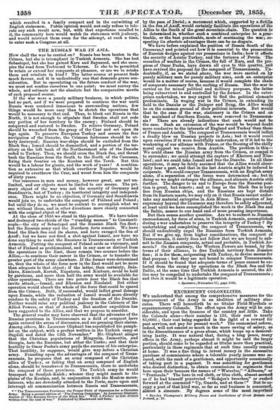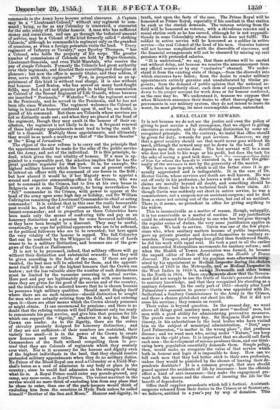EXCRESCENT COLONELCIES.
WE understand that among the comprehensive measures for the improvement of the Army is an abolition of military sine- cures. There will henceforth be no titular Field-Marshals or supernumerary Colonels The effect upon the Army will be con- siderable, and upon the finances of the country not little. Take the Colonels alone—their number is 135, their cost is nearly 85,0001.; their cost being regarded in the light of a reward for past services, not pay for present work.* The economical reform, indeed, will not consist so much in the mere saving of salary, as in the discontinuance of a gross abuse, which keeps up a demoral- izing laxity. It was natural that, during a long peace, many offices in the Army, perhaps almost it might be said the larger portion, should come to be regarded as titular more than practical, particularly in those regiments that at such time usually remain at home. It was a fine thing to invest money in the successive purchase of commissions where a tolerable yearly income was se- cured, with the rank of a gentleman, and opportunity occasionally of taking part in a pageant. It was something for gentlemen who desired distinction, to obtain commissions in regiments that bore upon their banners the names of "Waterloo," " Albuera," or "Peninsula." The hero in red cloth, or blue cloth, almost .seemed as if he had himself penetrated " Badajos's breeches," or rushed forward at the command "Up, Guards, and at them !" But to oc- cupy a post of that kind was, so far as real business is concerned, almost a sinecure. By degrees some of the most important
• Byerley Thompson's Military Forces and Institutions of Great Britain and Ireland, p. 25.
commands in the Army have become actual sinecures. A Captain may be a "Lieutenant-Colonel," without any regiment to com- mand; being, so far as any Colonelcy is concerned, a sineourist for the sake solely of the titular honour. A man who has sufficient money and connexions, and can go through the technical amount of service, may be a Colonel of the kind formetly called" clothing Colonels," although he commands his regiment only on the grandest of occasions, as when a foreign potentate visits the land. "Every regiment of Infantry or Cavalry," says Byerley Thompon, "has a Colonel, who holds the property of his corps. The greater number of commissions of Colonels are held by Major-Generals, Lieutenant-Generals, and even Field-Marshals, who receive the pay of simple Colonels. Formerly the Colonels had great authority over their regiments, and directed their recruiting and discipline at pleasure ; but now the office is merely titular, and they seldom, if ever, serve 'with their regiments." 'Now, in proportion as an ap- pointment of this kind is without real charge, it is also without real honour. Lord Seaton, who has served on many hard-fought fields, may feel a just and genuine pride in taking his commission as Colonel of the Second Regiment of Life'Guards, whose banners are inscribed "Peninsula," " Waterloo "—for the regiment served in the Peninsula, and he served in the Peninsula, and he has not been idle since Waterloo. The regiment welcomes the'Colonel as being in himself an honour conferred upon it, and he, no doubt, is proud of his command. But there are'Colonels -whose services are not so distinctly made out; and when they are placed at the head of the regiment, though they may exult in the honour of their ex- altation, the regiment is not likely to do so. A frequent renewal of these half-empty appointments must tend to bring the rank it- self to a disoount. 'Multiply these appointments, and ultimately they would be as much a mockery as that Of "the Roman Senator" or the "King of Jerusalem." The object of the new reform is to carry out the principle that the appointment should be-made for the sake of the public-service and the Army, and not of the individual. It is this principle, in- deed, which gives the real vitality of honour. If a man is ap- pointed to a responsible post, the selection implies that he has the
great qualities requisite for that post. It is, for example, the lighest military honour which the Crown can at present confer, to intrust an officer with the command of our forces in the field ;
but how absurd it would be if her Majesty were to appoint a
second and superior commanding-officer in the Crimea, who -was not to command in the Crimea, but to live at his own house in
Belgravia or in .some English county, he 'being nevertheless the
"full" commander in the Crimea, with power to appear at the head of the army npbn some high day or holiday, and Sir William
Codrington remaining the Lieutenant Commander-in-Chief or acting commander! It is evident that in thiscase the really honourable post -would be, not that of "full" commander, but -that of lieu- tenant-commander ; and in proportion as these Coloneloies 'have
been made only the means of conferring title and luty as an honorary distinction and a pension for some favoured individual,
IA) they have been brought to a discount. They may be useful, Occasionally, as sops for political opponents who are to be softened, or for political followers who are to be rewarded; but here again the very vitality of 'the 'honour is sapped. The full Colonelcy that can be conferred by the Whipper-in of the House of Lords ceases to be a military distinction, and becomes one of the gew- gaws of the Court or Parliament. It is not to be presumed, indeed, that military officers will go without their distinction and substantial rewards; but they will be given according to the facts of the case. If there are posts Vacated, the beat men will be selected for them, and the appoint- ment itself will be one of the highest honours that the Crown-can bestow; not the leas valuable since the number of such distinctions must be limited by the vacancies occurring in actual service. Here post and pay are legitimately given, and with some honour, since they are given for the good of the service and of the country, and the individual who is selected knows that he is chosen because
he possesses high military qualities. Should merit display itself where there are no such vacancies—should distinction be sought for men who are actually retiring from the field, and not entering upon it—there are other means which the Crown already possesses or might obtain. It can recommend for pensions ; and there is no doubt that the retiring veteran will find Parliament only too ready to remunerate his good service, and give him that pension for life which can support the "dignity," whatever it may be, that the Crown can confer. As to the dignity, there are the orders of chivalry precisely designed for honorary distinction ; and if they are not sufficient—if their numbers are restricted, their variety too small—it is in the power of the Crown to create new honours and new titles. Men can be made Knights Commanders of the Bath without compelling them to pre- tend that they are Colonels of regiments which they scarcely ever visit. Nor is it necessary for the honour and dignity even of the highest individuals in the land, that they should receive pretended military appointments when they do no military duties. No Prince of the Blood Royal can need aColoneloy or a Field-Mar- shal's baton as a card of admission to any body or place in the country ; since he could find admission on the-strength of being what he is. A Royal Prince could enter any parade-ground, any camp, any mess-room, as Royal Prince. The veriest martinet in the service would no more think of excluding him from any place that he chose to enter, than one of the park-keepers would think of excluding him from the sunshine in Hyde Park unless he called himself "Brother of the Sun and Moon." Honour and dignity, in
truth, rest upon the facts of the case. The Prince Royal will be honoured as Prince Royal, especially if his conduct in that station be such as the station demands. The veteran retiring from the field will be honoured as veteran, with a chivalrous renown and a social station such as he has earned, although he is not suppositi- tiously in some Colonehihip whose duties he does not fulfil. The soldier in active service will be honoured as a soldier in active service—the real Colonel at the head of his men. Genuine honour will not become complicated with the discredits of sinecures, and the financial arrangements will not be obscured by mixing up real pensions with pretended salaries. "It is understood," we say, that these reforms will be carried out without delay, not because we receive the announoement from any official sources or by any " exclusive " channel. We under- stantl it from the existing state of things,—from the _discredit into which sinecures have fallen; from the desire to render military appointments entirely genuine and unadulterated by titular pa- geants; from the demand of public opinion that the national ac- counts shall be perfectly clear, each item of expenditure being set down to its proper account for work done or for honour conferred, as the case may be. We understand it, because we suppose that when Ministers announce their desire to effect thoroughgoing im- provements in our military system, they do not intend to leave its worst, its most glaring, its moat contemptible abuse, untouched.



























 Previous page
Previous page